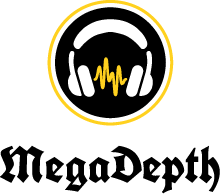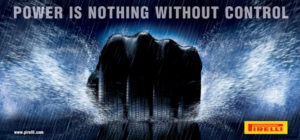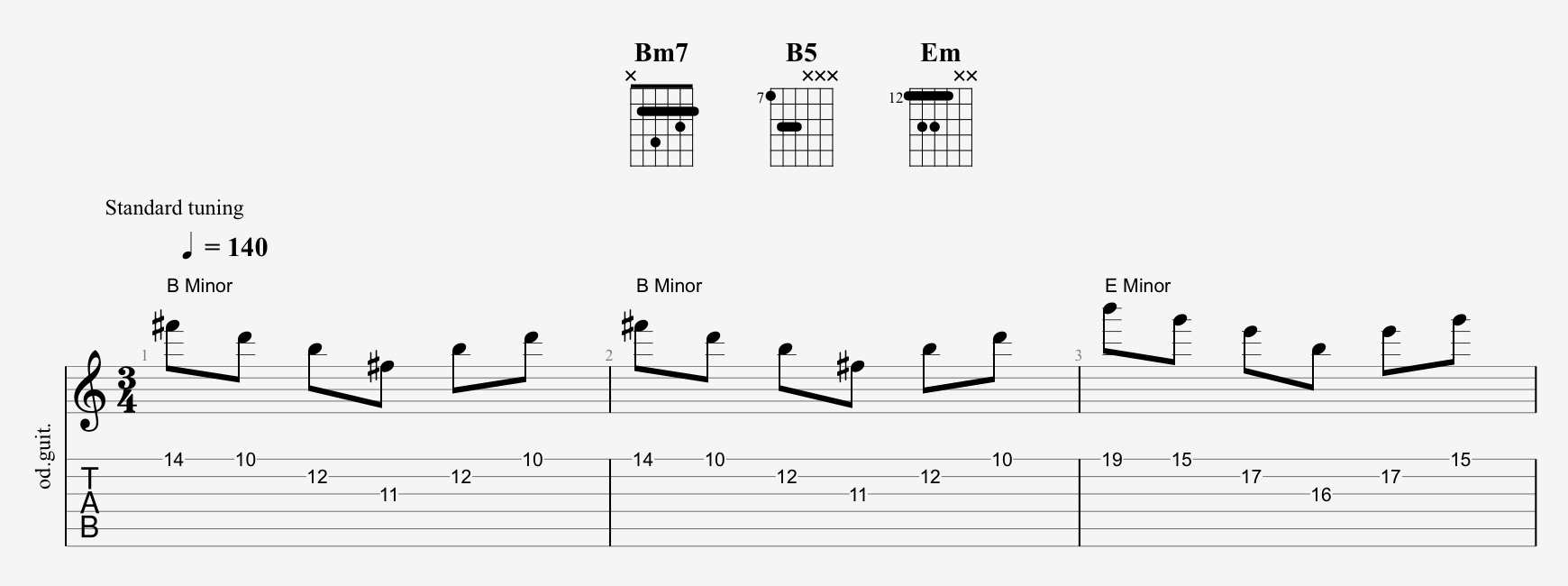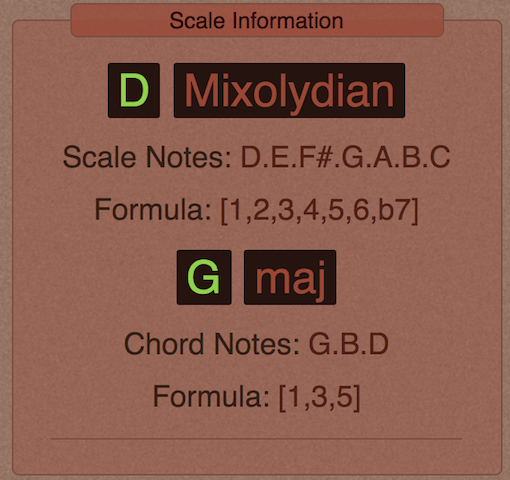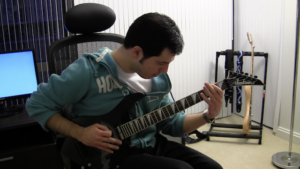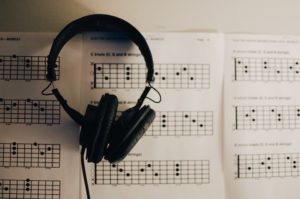
Photo by Kelly Sikkema on Unsplash
If you have been coming to this site, you probably noticed that I’m a guitar player, as well as an avid listener. I talked about my journey in learning guitar when I talked about my Jackson Professional Fusion EX, but I didn’t go into detail because I focused on one guitar in that article. With this post, I want to start a new area on my site where I will talk about theory, songwriting, and home recording. To start us off, I want to tackle a topic that I hear from a lot of guitar enthusiasts: music theory.
I personally had a rocky relationship with theory. For years I refused to learn because I didn’t think I was going to benefit from it. Well, I’m here to tell you I was wrong. Lately, I changed my approach and I’m seeing great results. If you are skeptical about learning theory, or if you are trying to learn but not succeeding, this article is for you.
First, a little bit about my guitar history…
I got into rock music when I was 10, back in 1995. But it wasn’t until 1998 that I started getting into guitar specifically, and that was around the time I discovered Megadeth and got into heavier music. I still remember being blown away by the guitar playing when I saw the video to Holy Wars…The Punishment Due and thinking “I need to learn how to play”.
I started taking lessons in 2000 and for a few years, I made some good progress. My teacher at the time tried to teach me theory, but I just wasn’t interested. It made me feel like I was at school and I thought guitar playing was supposed to be my escape! I still learned a lot from him – he taught me how to discipline myself with the metronome and improved my sense of rhythm big time!
By the time I was 21, I’d finished college and started working in management consulting. The working hours were insane, and it completely took over my life. When I got home, I was way too tired to even pick up the guitar, so I pretty much didn’t play for a few years. If these sound like excuses, it’s because they are. In hindsight, I should have played every day even if it was just for a few minutes. I regret not taking guitar playing more seriously when I was younger, but you can only move forward! So, I did.
I moved from Istanbul to Boston in 2010 to attend BU’s MBA program, and one of the first things I did was buy a new electric guitar. In case you’re curious, it was a Jackson DK2S. I took some lessons after I was done with graduate school, but I still wasn’t into music theory. It still felt like school time, and I couldn’t see the benefit. I improved some technique, learned a few cover tunes, and even played the talent show at BU, but that was it. After getting my degree, I started working full time in advertising and, once again, work took over my life and I went through similar excuses and didn’t play that much for another couple of years.
Fast forward to 2 years ago! I quit my corporate job, set my own digital analytics company and started working with a more flexible schedule. Guess what the first thing I did was! Start guitar lessons again… But this time I wasn’t going to make any excuses. It was time to play and time to improve!
There are lots of things I still need to learn. I am by no means done with my learning (is anyone?). But I can’t tell you how much more confident I feel when I play because I can see improvement. And that improvement didn’t just come in one aspect of my playing, it came in several: theory, technique, songwriting, and home recording. Like I said, I feel like I’ve only scratched the surface, but it’s a damn good start!
Before I start talking about theory, I will say this: if you want to improve, the most important thing is determination. You’ve got to want to improve if you want to see results. In my 20s, I thought I loved guitars and playing them, but I think I only loved the ‘idea’ of guitar playing. Now in my 30s, I know I truly love guitars and playing them. Two years ago, I felt ready to take this seriously. I genuinely wanted to improve. I still have a full-time job and other obligations that occupy most of my time. I’m not a full-time musician so I can’t devote 3-4 hours every day to playing. And that’s okay. I still try to play every day now; even if it’s only for 20 minutes, and more whenever I can. Consistency makes a difference!
My determination was one reason why I saw improvement, but there was another one. In late 2016, I decided I wanted to take guitar lessons again. I had moved outside of Boston into the suburbs, and I couldn’t find anybody to come to my apartment to teach me. So, I looked for online lessons and I found a teacher who had gone to Berklee College of Music and who was now living in Chicago. I checked out some of his videos, saw him playing a cool ESP Horizon, liked what he had written in his biography on Reverb Lessons (a site which is now closed) and decided I was gonna give lessons with him a try. The reason why I wanted to get a teacher again was because I needed someone to guide me a little bit, so I could prioritize better. One of my favorite quotes that I saw in a Pirelli tire commercial when I was a kid is “power is nothing without control”. You can play for hours and hours every day, but if you don’t know what you’re doing, you’re not really in control. I wanted to have that controlled power. I wanted to know exactly what I was putting into my playing.
My teacher, Cameron Ryan, has been a big influence in my playing. I was apprehensive about online lessons at first, but if you find the right teacher, it works just fine. The first thing Cameron said to me was “why don’t you write your own songs?”. I remember thinking that it was impossible to write stuff without knowing theory first. Then he said something that has shaped my approach ever since. He told me that music theory is great to help you flesh out your idea and give you more options to color your song, but it’s not going to start your song for you! In other words, you shouldn’t sit down and say “today I’m going to write a song in this key or using this scale”… You could do that, of course, but then you’d get predictable. It’s better to grab your guitar, jam, and see what comes out. Let your creativity flow. And then use theoretical knowledge to take your riffs or melody and turn it into a song. Looking at music theory in this light changed my whole attitude.
I will talk about home recording, songwriting, and technique in later posts. But for now, let’s go back to theory. I plan on writing about theory in more detail in later posts, but I want to touch upon a few things that helped me. I hope these will help you too.
1. Be Open to Learning Theory
I’ve alluded to this earlier when I said that you needed to be determined to improve. This obviously goes for learning theory too. The main reason why I didn’t learn theory earlier is that I didn’t want to learn. Once that changed and I was determined that I was finally going to do it, it actually became fun to unlock the “secrets” of this world. Now, I can’t wait to learn more and more – I’ve only just discovered the tip of the iceberg!
2. Understand Why; Don’t Just Memorize
By far, the biggest mistake you can make in this process is to try to memorize everything. If your fingers, in other words muscle memory, remember the notes of a certain scale, that’s great! But trying to memorize the notes in every scale and every chord as if you’re about to take a history exam the next day? It’s not going to do you any good because you’ll eventually forget it anyway. Theory is supposed to help you write songs, jam with other people, and learn others’ songs quicker. So, try to understand why a certain key is comprised of certain modes. Understand how those modes are structured, what the formula is and why. Understand how and why certain chords can go with these modes and how you might be able to color your song idea using them. For example, why does the A Minor chord work with the G Major scale? Don’t just memorize that A Minor could be used with G Major, but understand why that is. Or, what gives the Phrygian scale its characteristic tone? What I usually do is I first try to understand how a mode is structured and apply that understanding to my playing and improve muscle memory, as well as ear training. You’ll always need to learn the essence of a mode, or a chord, or a certain key. You can’t memorize everything, nor should you.
3. Start Small; Don’t Bite More Than You Can Chew
If you are new to learning theory, like I am, remember that we can’t learn everything at once. My guitar teacher has had years of training in this area – it’s not possible for me to learn everything he knows in one or two lessons. It’s going to take time and that’s okay. What I do, is I try to learn one mode every week. It might seem small, but given my other duties throughout the week (musical or otherwise), that’s the best I can do. Every week I take that mode and learn its formula, what key(s) it’s in, and what some chords that go well with it are. I sometimes need to go back and refresh my memory or learn more chords that can go with it – but I don’t feel overwhelmed. I know I can handle this workload. So, don’t stress yourself. Keep calm, and make sure that you learn something new every week so you can make progress.
One additional note here is that I write everything down as I learn. I use Microsoft OneNote to keep all my notes synced up, but any tool that allows you to jot down some stuff will do just fine. Just make sure you create a reference guide for yourself.
4. Don’t Buy Into the Myth of ‘Theory Kills Creativity’
I’m sure you’ve heard of this before. Perhaps that’s how you convinced yourself not to learn theory. I’m not saying that everyone has to learn theory, but to suggest that it kills creativity is being naive. If anything, it flourishes it. My guess is that people who think music theory kills creativity assume that one day you sit down and tell yourself “Alright, let’s do a song in D Major” or something similar. But, as I said before, that’s not how any of this works. Theory can’t write your song for you. You have to do it yourself. It’s just a tool to help you harmonize better, write solos better, and communicate with other musicians better. I spent my 20s thinking theory wasn’t going to help me. So, trust me on this; I was wrong. It helps, and it sparks so many new ideas. It certainly won’t kill your creativity!
5. Take Advantage of Educational Apps or Sites
I use a few, but I’ll highlight two that I use a lot.
Guitar Pro:
I’ve been using Guitar Pro for a long time. In the past, I used it only to learn songs from other bands. I still do that sometimes, but nowadays it’s more about transcribing my own songs or licks. One great feature that they have is the virtual guitar keyboard. On that keyboard, you can see all the notes on the guitar. That is really useful if you are a visual learner, like me. Furthermore, you can select the scale you are working with and see all different positions. I know that there are many sites that provide this virtual keyboard feature. But the benefit of Guitar Pro is that you get to see all those notes on the same platform that you write your songs on. And you write, you can make notes about the scales or chords you’ve written so you can refer back to them anytime.
I randomly stumbled upon it and I love it. I go to their website, but I think they also have apps on some mobile stores. What I like about them is, if you go to the “Scales” page and select your key and mode, not only do they show you the notes in the mode, but they also explain the formula. In order to understand those formulas, you’ll need some background, but once you get there, this site will help you go deeper. It’s a great platform to learn what notes make up each mode and why. As if that wasn’t enough, they also show you all the chords that go with the mode you selected, and if you click on the chords, they’ll show you what particular notes make up the chord and you can easily understand why that chord can go with that particular mode. It’s all about getting to the why and this site is the hidden treasure to help you get there.
6. Make it fun!
This is a personal note, but I’ve never liked learning a mode by learning the so-called positions. You know how most sites show you, like position 1, position 2 etc. I don’t think that’s helpful because it doesn’t allow you to see the bigger picture and it’s also not very musical to go up and down a scale, as those positions would force you to do. Besides, it’s just not fun at all to go from one position to another without any groove or musicality. Note: if that approach works for you, then great! This part is more for people for whom it doesn’t.
What works for me is I write my own licks after I’ve just learned a new mode or chord. I start on my guitar, and then I transcribe some of that on Guitar Pro (check screenshot above). That enables me to see the entire mode on the virtual keyboard and I start getting ideas on how I can explore further. But the most important thing is that I solidify what I’ve just learned because I’m writing and playing in that particular mode! In other words, theory isn’t just on paper anymore – I’m actually practicing it! And it’s loads of fun because I’m writing my own stuff. I play around with tempos, with note durations, and with time signatures. There’s a lot of musicality – and it sparks a lot of new ideas for future songs. I’m not telling you to write an entire song in the key or mode you just learned – but writing a lick with some harmony in the mode you just learned will make things fun and you won’t easily forget what you learned. And hey, it could lead to an idea that you may later turn into a song! Learning a scale by going up and down different positions did nothing for me. But this way, every week or so I create a small new lick and I take it from there! You gotta have fun – and theory can be great fun if you have a better approach to learning.
So, there you have it. I will do more articles about guitar playing because I want to connect with some other players who might be going through the same struggles as I do. I will get into songwriting, home recording, technique, and all that great stuff in later articles. If you want me to cover a particular topic, let me know in the comments!
